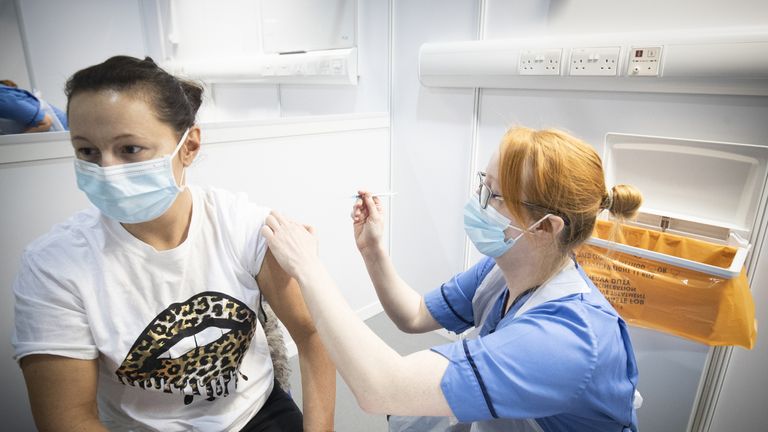Germany has said the Oxford/AstraZeneca vaccine should not be offered to people over the age of 65, a source close to the country's government has told Sky News.
It comes after Reuters reported Germany's vaccine committee made the recommendation, citing insufficient data about how effective the jab is for older people, not because of any safety concerns.
But UK Prime Minister Boris Johnson said he was not worried because Britain's medicines regulator had judged it is "effective across all age groups and provides a good immune response across all age groups".
He added "I don't agree" with the apparent assessment in Germany.
Live COVID updates from the UK and around the world
A spokesperson for AstraZeneca said its research findings "support efficacy in the over 65 years age group".
And Public Health England said the immune response data was also "very reassuring", though it added there were too few cases in older people in trials to say what precise level of protection the over 65s get.
Dr Mary Ramsay, head of immunisations at PHE, said: "There were too few cases in older people in the AstraZeneca trials to observe precise levels of protection in this group, but data on immune responses were very reassuring," she added.
"The risk of severe disease and death increase exponentially with age - the priority is to vaccinate as many vulnerable people as possible with either vaccine, to protect more people and save more lives."
The European Medicines Agency is expected to make a decision on whether to approve AstraZeneca's COVID-19 vaccine on Friday.
It comes as Brussels and the pharmaceutical giant are embroiled in an open, escalating row over the EU's slow start to its inoculation programme.
Belgian authorities said on Thursday they had carried out an inspection of a vaccine factory in the town of Seneffe on instruction from the EU Commission.
AstraZeneca announced it would have to cut the amount of jabs delivered to the bloc's 27 nations before the end of March from 80 million to 31 million, citing production issues at European factories.
But the EU's health commissioner Stella Kyriakides said AstraZeneca should make up for the shortfall by shipping over jabs made at its plants in Britain instead.
Sky News understands that AstraZeneca has agreed to publish its supply contract with the EU.
Professor Stephen Evans from the London School of Hygiene and Tropical Medicine said there is "no reason at all for anyone in the UK or elsewhere to think that this Oxford/AstraZeneca vaccine is ineffective at any age".
He added: "Its ability to be delivered to people in GP surgeries and care homes makes it a vital component in the attempts to reduce hospitalisation and deaths, especially in the elderly."
Prof Andrew Pollard, chair of the UK government's Joint Committee on Vaccination and Immunisation, also said: "There is limited information available on efficacy in participants aged 65 or over, although there is nothing to suggest lack of protection."
Analysis: Why has Germany reached its decision?
By Thomas Moore, science correspondent
The German decision threatens to undermine public confidence in the rollout of the AstraZeneca vaccine in the UK.
The widely-respected Robert Koch Institute concludes that there just isn't enough data to prove the vaccine protects the elderly against COVID.
And yet they are precisely the people front of the queue in the UK.
This all hinges on data from the late-stage clinical trials done by the pharmaceutical company.
Just 8% of the volunteers were between the age of 56 and 69. And only 4% were over 70.
Critically there weren't enough COVID infections in those age groups to show there was a statistical difference between those who got the vaccine and those who got the placebo.
But AstraZeneca has published evidence from earlier clinical trials in The Lancet medical journal. These were lab-based tests of antibodies produced by people given the vaccine.
They show that the antibodies in the elderly are just as effective at killing the virus as those from younger people.
That was enough for the UK medical regulator, the MHRA, to approve the vaccine.
And to be fair, many independent scientists would agree with that assessment.
There is a good relationship between 'neutralising' antibodies seen in the lab tests and real world protection - and there is no magical cut-off in the age of a patient beyond which a vaccine stops working.
But the German authorities clearly want more evidence. And it may be that the European Medicines Agency agrees when it publishes its assessment on Friday.
AstraZeneca is already doing an additional large-scale clinical trial in the US that includes more older volunteers.
It's almost certain that the US regulator, the FDA, will wait until those results come through before licensing the vaccine at all.
The UK authorities are likely to hold firm, arguing that there is good-enough evidence that the vaccine works - and given the high infection rate rolling out the vaccine will save lives.
https://news.google.com/__i/rss/rd/articles/CBMicGh0dHBzOi8vbmV3cy5za3kuY29tL3N0b3J5L2NvdmlkLTE5LWdlcm1hbnktc2F5cy1veGZvcmQtYXN0cmF6ZW5lY2EtamFiLXNob3VsZC1ub3QtYmUtZ2l2ZW4tdG8tb3Zlci02NXMtMTIyMDE0NTjSAXRodHRwczovL25ld3Muc2t5LmNvbS9zdG9yeS9hbXAvY292aWQtMTktZ2VybWFueS1zYXlzLW94Zm9yZC1hc3RyYXplbmVjYS1qYWItc2hvdWxkLW5vdC1iZS1naXZlbi10by1vdmVyLTY1cy0xMjIwMTQ1OA?oc=5
2021-01-28 16:30:00Z
52781336752031

Tidak ada komentar:
Posting Komentar